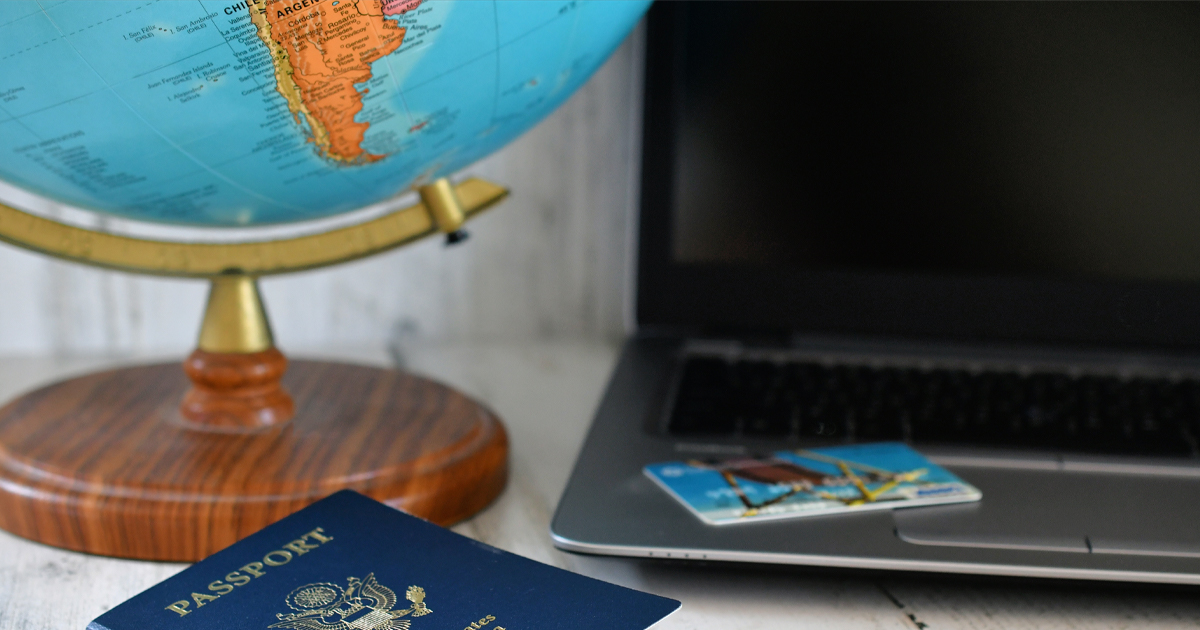La Salle University
Traveling the world—from a virtual classroom
Virtual travel study courses at La Salle give students a chance to experience different cultures, customs, and landscapes during the pandemic.
A TikTok personality as a guest speaker in a college course about… Ireland? These are, indeed, unprecedented times.
Like many academic institutions during the pandemic, La Salle suspended university-sponsored travel and international learning experiences for the 2020-21 academic year. All the while, La Salle has offered virtual travel study courses and international intellectual exchange programs as an alternative.
The courses allow students to experience different cultures remotely, while giving instructors an opportunity to get creative within their syllabi and areas of experience.
Francis McKee’s Irish American Experience is one example. McKee’s students gained an audience with Shane O’Sullivan, a farmer from southwest Ireland who has amassed more than 150,000 followers as the “Kerry Cowboy” on TikTok.
“We had (Pennsylvania) Congressman Brendan Boyle talking to the class about his parents immigrating to Philadelphia, and his experience growing up in Olney as a first generation Irish-American,” said McKee, the director of American studies at La Salle. “The students really connected with (Boyle’s) story, but the Kerry Cowboy was the star of the class.”
McKee led La Salle’s first virtual international travel study course, offered during the winter intersession. One of the biggest challenges he faced, McKee said, was distilling centuries of Irish history and culture into a four-week term. The class met twice weekly, in synchronous and asynchronous formats, with McKee presenting a mix of speakers, like former BBC correspondent Martin McGinley who shared his experiences covering the Northern Ireland conflict. Other elements of McKee’s course included a virtual tour of the popular coastal route the Wild Atlantic Way, and introductions to Irish musicians like Mairéad Ní Mhaonaigh of the band Altan.
McKee’s ancestors hail from Ireland. He has visited the country numerous times. His goal, he said, was to give students a sense of the Irish experience rather than “a class about Ireland.”
“We did a lot visually on specific locations and with our guests,” said McKee. “I wanted to strike a balance between staid academics and things the students could relate to. We managed to snag a pro surfer from Ireland, Conor Maguire. Students were shocked to learn that Ireland has a huge surfing culture.”
La Salle is offering students other virtual opportunities to explore different cultures and countries, too.
The Lasallian Immersion and Volunteer Experience (LIVE) program recently partnered with the De La Salle Blackfeet School in Browning, Montana, for a panel discussion on Native American heritage and advocacy. The hybrid event brought together La Salle students—those on campus and studying remotely this semester—with students more than 2,000 miles away.
For the spring semester, associate professor of history Lyman Stebbins, Ph.D., is leading a virtual travel study course “Iran: A Journey.” His class meets twice weekly, synchronously, with students reading from 1,000-year-old texts and more-current materials like the Lonely Planet guidebook to Iran.
A noted Iranian scholar who serves as an editor of the journal, Iranian Studies, Stebbins has designed the course so students can get a feel for the landscape, architecture, customs, culture, and diversity of thought that he experienced while traveling throughout the country for five months in 2004.
“Instead of a chronology, it’s built around an itinerary and the feel of going from place to place,” said Stebbins, who previously co-led an international travel studies trip to London and chaperoned a trip to Nepal. “We land, virtually, in Tehran, and I take them throughout the country. Each student gives two 10-minute guided tours of a particular location. There are opportunities every class for students to take us some place I might not take them.”
Stebbins also aims to convey both the complexities and the challenges of modern Iran.
“Iran, in much of the American experience, has a negative connotation,” said Stebbins. “But Iran is a lot bigger than the Islamic revolution and its history is a lot longer. Its people are extremely hospitable. Women in Iran have more freedom than one might expect, but less freedoms than one would hope for. Part of travel, fundamentally, is breaking through stereotypes and learning something about your own society. It’s a little difficult to do when you’re not there, but it’s a puzzle we’re figuring out in the classroom.”
La Salle’s virtual travel study programs have been received well by the University’s students—a sign that they could be used to compliment La Salle’s in-person experiences moving forward, said Lisa Jarvinen, Ph.D., associate dean of the School of Arts and Sciences and associate professor of history.
“I can imagine having virtual travel study courses alongside in-person ones when we do return to permitting international travel,” said Jarvinen, who worked with McKee and Stebbins on their respective courses. “For instance, Professor Stebbins’ virtual travel study is to a destination where students most likely would not have been able to travel. Politics, distance, cost, and other factors can put limits on where it’s possible to travel or how many students could take part.”
“With virtual trips,” Jarvinen added, “we can be creative and offer students other options for learning.”
—Patrick Berkery
